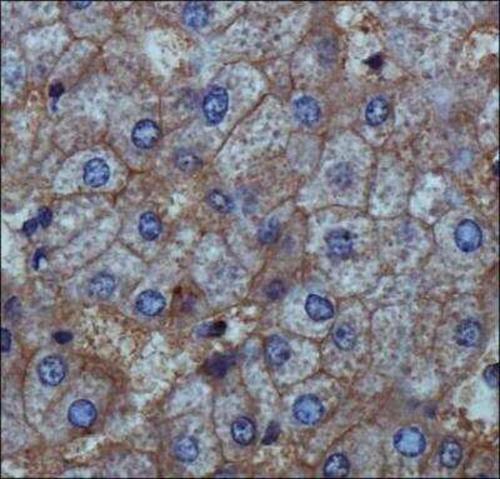ENPP1 Goat Polyclonal Antibody
USD 200.00
USD 867.00
USD 436.00
Specifications
| Product Data | |
| Applications | IHC, WB |
| Recommended Dilution | Immunohistochemistry, Western Blot: 1:1000, Peptide ELISA: 1:2000, Immunohistochemistry-Paraffin: 1:200 |
| Reactivities | Human |
| Host | Goat |
| Clonality | Polyclonal |
| Immunogen | A synthetic peptide made to a C-terminal portion of the human ENPP1 protein (between residues 900-925) [UniProt P22413] |
| Formulation | PBS, 0.05% Sodium Azide. Store at 4C short term. Aliquot and store at -20C long term. Avoid freeze-thaw cycles. |
| Concentration | lot specific |
| Purification | Immunogen affinity purified |
| Conjugation | Unconjugated |
| Storage | Store at -20°C as received. |
| Stability | Stable for 12 months from date of receipt. |
| Predicted Protein Size | 140 kDa |
| Gene Name | ectonucleotide pyrophosphatase/phosphodiesterase 1 |
| Database Link | |
| Background | ENPP1 (ectonucleotide pyrophosphatase/phosphodiesterase family member 1) is a type II transmembrane glycoprotein which is implicated in membrane surface ATP hydrolysis, regulation of pyrophosphate levels, bone mineralization as well as soft tissue calcification. ENPP1 negatively regulates bone mineralization by hydrolyzing extracellular nucleotide triphosphates (NTPs) to produce inorganic pyrophosphate (PPi, an inhibitor of mineralization), whereas tissue-nonspecific ALP positively regulates mineralization by hydrolyzing NTPs and PPi to produce extracellular concentrations of inorganic phosphate (Pi, a substrate for mineralization). ENPP1 is expressed on outer surfaces of mineralizing cells, such as osteoblasts and chondrocytes, and on the membranes of osteoblast- and chondrocyte-derived matrix vesicles. It also hydrolyzes other NTPs such as GTP, CTP, TTP, UTP etc. to their corresponding monophosphates with the release of PPi and diadenosine polyphosphates, and also 3',5'-cAMP to AMP, and may also regulate the availability of nucleotide sugars in ER/Golgi complex, as well as the regulation of purinergic signaling. ENPP1 binds directly to INSR for inhibiting insulin signaling and ENPP1's K173Q/ K121Q polymorphism is associated with insulin resistance, NIDDM, and obesity. Defective ENPP1 causes increased susceptibility for ossification of the posterior longitudinal ligament of spine (OPLL), arterial calcification of infancy, generalized, type 1 (GACI1), obesity/glucose intolerance/NIDDM, and rickets hypophosphatemic autosomal recessive type 2 (ARHR2). |
| Synonyms | ARHR2; COLED; M6S1; NPP1; NPPS; PC-1; PCA1; PDNP1 |
| Note | This ENPP1 antibody is useful for Peptide ELISA, Western Blot and Immunohistochemistry-paraffin embedded sections. In Western blot a band was observed at ~130-150kDa in Human Liver and HepG2 lysates that was blocked by preincubation with the immunizing peptide. Prior to immunostaining paraffin tissues, antigen retrieval with sodium citrate buffer (pH 6.0) is recommended. |
| Reference Data | |
| Protein Families | Druggable Genome, Transmembrane |
| Protein Pathways | Metabolic pathways, Nicotinate and nicotinamide metabolism, Pantothenate and CoA biosynthesis, Purine metabolism, Riboflavin metabolism, Starch and sucrose metabolism |
Documents
| Product Manuals |
| FAQs |
| SDS |
{0} Product Review(s)
Be the first one to submit a review






























































































































































































































































 Germany
Germany
 Japan
Japan
 United Kingdom
United Kingdom
 China
China




